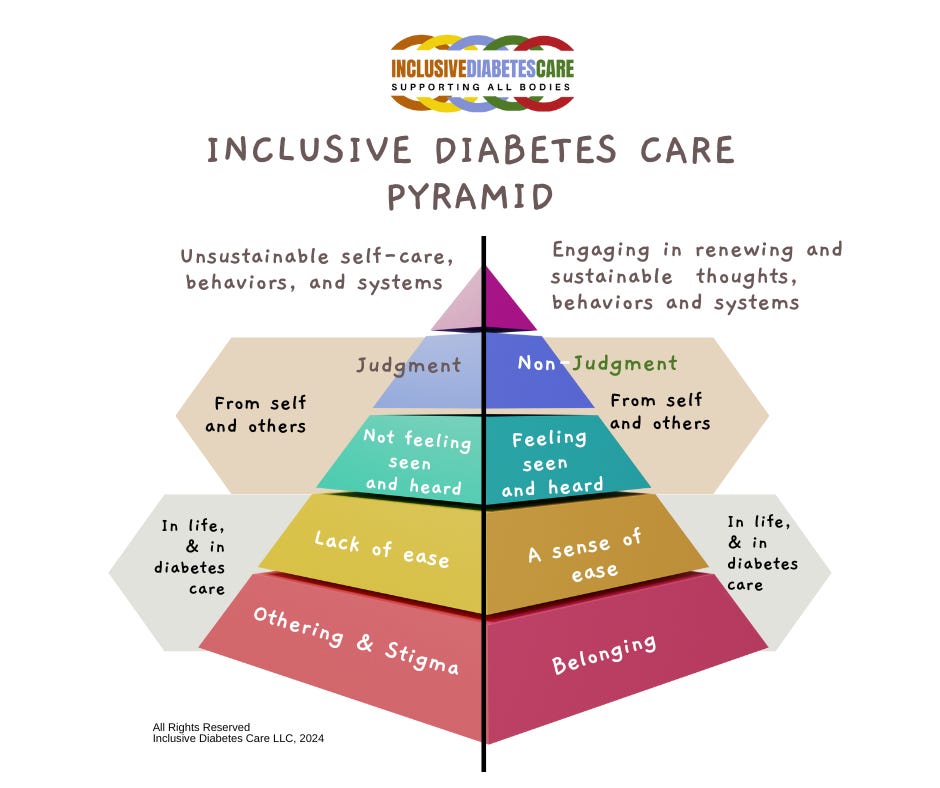Why Inclusion Works In Diabetes?
And how it also heals us, the professionals working in diabetes, our community and so much more!
The invitation to stop striving
As human beings, we all have dull, conflicted, and broken parts of ourselves. And like many people, I have been trying to ‘fix’ them for decades. In March 2022, something ineffable happened while on a 10-day silent meditation retreat. No, this isn’t a story about the transformation where I share an epiphany, and my life bursts into rainbows and butterflies. What happened was an invitation and the decision to accept myself. In the resulting 13 months, I continued to invite myself to stop running, striving, and hiding from the parts of me that felt like I didn’t belong.
Let me introduce myself. My name is Megrette Fletcher, pronounced with a long E, ME-gret. It sounds like the shorebird, egret, but if you don’t like me, regret. I am a registered dietitian, RDN, diabetes care, and education specialist CDCES, with a master’s degree in nutrition education. I have been meditating on a daily basis for 25 years. After co-founding The Center for Mindful Eating, TCME.org, I have chosen to write extensively on mindfulness and weight-inclusive diabetes care for the last 15 years.
Inclusion is essential
Receiving an invitation to stop striving is a bit of an oxymoron in the post-covid healthcare culture. How can you change without striving? How do you achieve anything without a goal? The answer, over and over again, was I didn’t have the capacity to change. My thoughts conflicted with my deeper values, and I was drained from work and the countless expectations within our society.
Transformation wasn’t possible.
The more I accepted myself, the more I wondered, how can anyone transform if they are exhausted? Or if the educational training fails to talk about conflicted and broken parts of our jobs, is that okay or gaslighting? While my younger self thought inclusion was the ‘right’ thing to do, my present-day self sees how everything changed when I realized I belong. The concept of inclusion includes us, the healthcare professional. This meant I had to accept my suffering, those broken parts that fueled my exhaustion, and repeated the belief that striving, pushing, and rushing creates an effective healthcare system.
Check out the short Buddhist story about the value of accepting that our suffering exists and how to ‘fix’ it. You’re Late
Sizeism amplifies all forms of oppression.
Humans are hardwired toward belonging. While this isn’t a new ‘fact,’ a vast amount of research explains why belonging is fundamental. A Person With Diabetes, PWD, also needs to feel that deep sense of belonging. The most common way they ‘fit in’ is to step on the treadmill of striving: i.e., counting, weighing, or trying the ‘newest’ thing. This is what Christy Harrison calls “Wellness Culture.”
This emphasis on striving, and doing MORE, is exhausting. It also has reduced diabetes care into a series of binaries that continue to limit healthcare, our resources, energy, and effectiveness. Weight stigma, weight bias, diet, and wellness culture are the tools that have been used to divide and silence the importance, value, and need for diabetes care.
Connecting the dot between the impact of stigma and “othering” and the social determinants of health is slow and tricky work because the tools of oppression are always within reach. Using oppression to fix oppression is familiar.
“The master’s tools will never dismantle the master’s house,”
Audre Lorde author of Master's Tools Will Never Dismantle The Master's House
It takes effort to resist the simple narratives surrounding sizeism. These conversations are complex, the research is confusing, and those with lived experience are often missing. The good news is that weight bias and stigma are emerging conversations in diabetes care.
Success begins with revisualizing diabetes care.
The basic needs for inclusion diagram outline five felt senses necessary to provide inclusive diabetes care. These steps are also your invitation to belong. The dream is for everyone to experience ease, feel seen and heard in a non-judgmental way so that we can all engage in wholesome self-care.






